Digital Branding Strategies
How to Create a Popular Name Brand: A Step-by-Step Guide
Overview
To establish a popular name brand, conducting thorough market research is paramount. This process should be followed by:
- Brainstorming creative name ideas
- Rigorously testing them with your target audience
- Ensuring their uniqueness
- Seamlessly integrating them into your overall branding strategy
A strong brand name not only enhances recognition and trust but also aligns with consumer values. This alignment ultimately contributes to business success and fosters customer loyalty. Therefore, Brand Managers must recognize that the right name is not merely a label; it is a strategic asset that can significantly influence market perception and consumer engagement.
Introduction
In the competitive landscape of modern business, the significance of a strong brand name is paramount. It serves as the cornerstone of a company’s identity, influencing consumer perception and loyalty from the very first interaction. A well-crafted brand name does more than just identify a product or service; it encapsulates the essence of a brand’s values and mission, setting the stage for recognition and trust.
Iconic examples such as Apple and Nike illustrate how names can resonate deeply with audiences, creating lasting connections that foster brand loyalty. As organizations strive to differentiate themselves in an ever-evolving marketplace, understanding the key elements of effective brand naming becomes essential.
This article delves into the critical steps involved in creating a compelling brand name, from market research to testing ideas, ensuring that businesses not only stand out but thrive in a crowded environment.
Understanding the Importance of a Strong Brand Name
A powerful label is indispensable to your business identity, serving as the initial point of contact for prospective clients. It plays a critical role in establishing recognition and trust, making it essential for any successful branding strategy. A thoughtfully chosen title can evoke emotions, reflect your company’s core values, and distinguish you from competitors.
Consider renowned companies such as Apple and Nike; their titles resonate deeply with their audiences, creating a lasting impression that fosters loyalty.
At WonderEight, we understand that a robust identity is merely the starting point. Our commitment to talent acquisition for creative positioning and digital solutions ensures that your brand not only stands out but also flourishes in a competitive market. We offer a variety of services, including:
- Brand Audit
- Brand Strategy
- Digital Marketing Strategy
to assist you in establishing an identity that genuinely reflects your business.
Statistics reveal that 88% of customers prioritize authenticity in branding efforts, underscoring the necessity for a label that embodies your core values. Furthermore, a powerful name can significantly impact consumer trust; companies that uphold authenticity are more likely to forge enduring connections with their clients, even amidst challenges. In fact, a recent study indicated that 82% of potential job candidates consider a company’s reputation before applying, highlighting the importance of a strong identity in attracting not only customers but also talent.
As Gary Zurnamer, Co-Founder and CEO, notes, “Loved by companies like Canva, Nike, Cisco, Stryker, HubSpot, Amazon and more, tools like Vouch make leveraging video in your business remarkably easy.” This underscores the modern marketing approach, where video can enhance identity and engagement—a strategy we implement at WonderEight to elevate your presence.
However, neglecting identity can lead to severe repercussions; inadequate marketing can erode customer trust and diminish sales. Successful labels, such as Coca-Cola and Amazon, demonstrate how effective marketing can enhance customer trust and recognition for a popular name brand. These companies have positioned themselves as leaders in their respective markets, illustrating that a strong identity can yield higher sales and consumer loyalty.
By acknowledging the significance of a strong identity and leveraging WonderEight’s extensive branding and digital marketing solutions, including events and activations, you lay the groundwork for a powerful strategy that resonates with your target audience and fosters global business success.
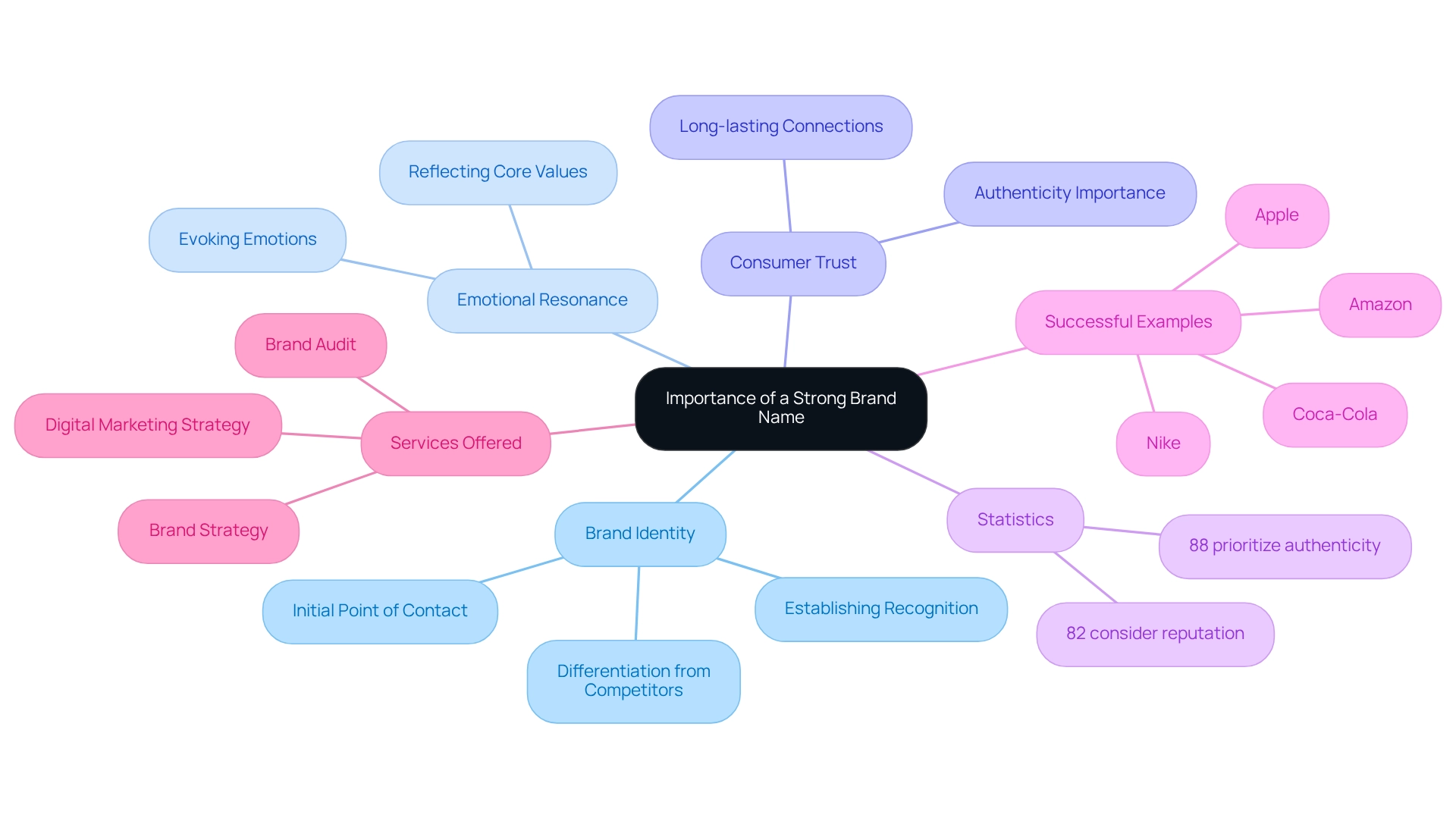
Key Elements of an Effective Brand Name
An effective label embodies several crucial elements: it must be memorable, easy to pronounce, and closely aligned with the identity of the company. Distinctiveness is essential, enabling the brand to stand out in a saturated market. Legendary titles such as ‘Coca-Cola’ and ‘Google’ exemplify popular name brands that not only attract interest but also embody the core of their identities.
Research indicates that companies maintaining a consistent identity are 3.5 times more likely to achieve strong visibility, underscoring the significance of a well-designed label.
Ideally, an effective label should consist of two to four syllables, as shorter titles tend to be more memorable. Additionally, it should evoke positive associations, significantly influencing public perception. Notably, 88% of consumers prioritize authenticity in marketing initiatives, making it essential for labels to connect genuinely with their target audience.
Memorable labels are characterized by clarity, simplicity, and emotional resonance. Names that are easy to remember and articulate foster stronger connections with consumers, enhancing customer loyalty. Furthermore, impactful product titles from popular name brands often incorporate elements that reflect the entity’s values or mission, thereby fostering a stronger bond with the audience.
As emphasized by Invesp, 38% of mothers are more inclined to purchase products and services from companies that other women ‘Like’ on Facebook, illustrating the influence of social proof on perception. Moreover, only about one in three users express confidence in the labels they currently utilize, highlighting the necessity of building trust through effective marketing, particularly concerning product titles. As we approach 2025, understanding these key elements will be crucial for companies aiming to create a lasting impact in the marketplace.
Moreover, with 82% of prospective candidates assessing a company’s image before applying for a position, the significance of company identities extends beyond products, emphasizing their broader implications.
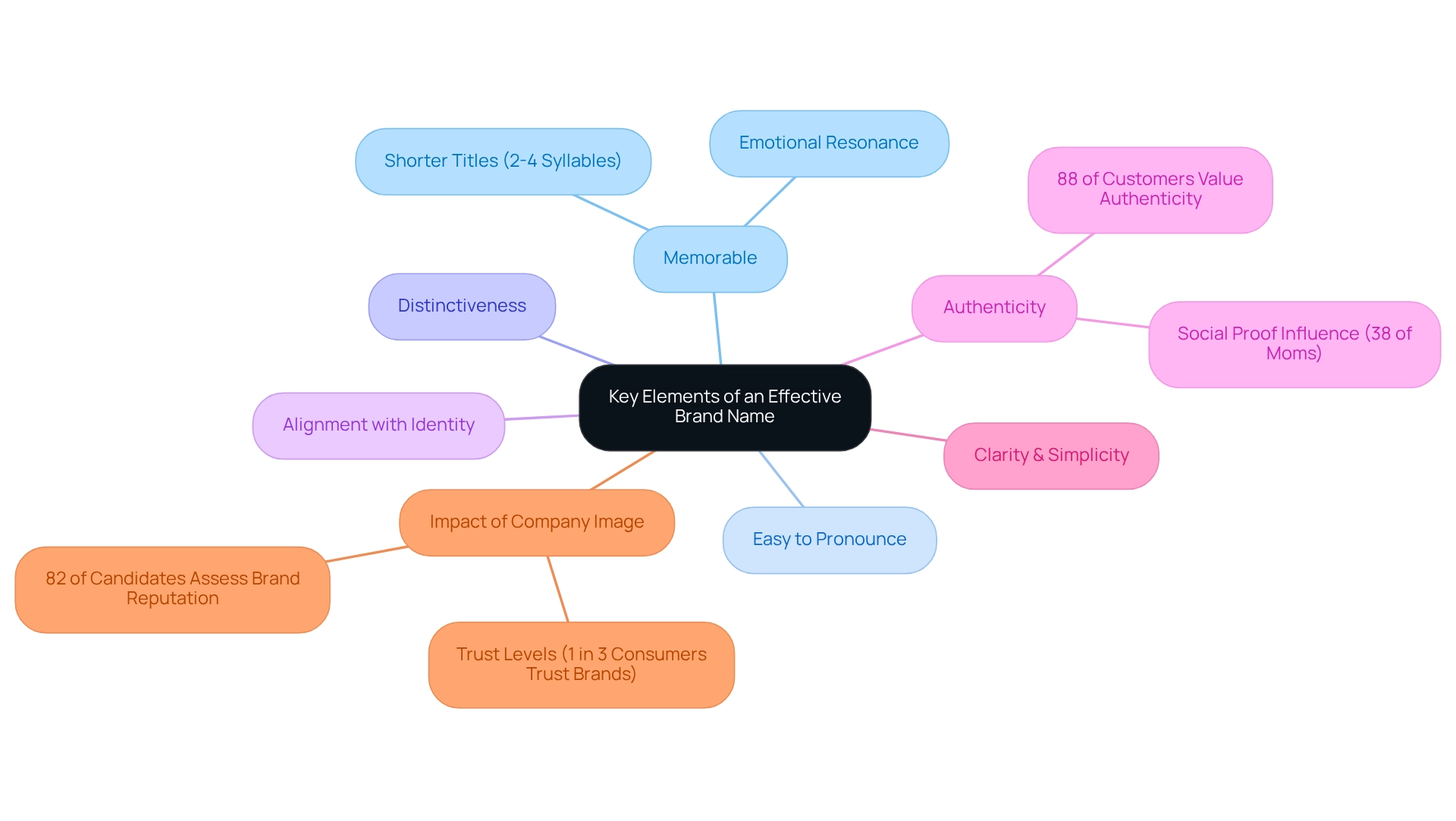
Step 1: Research Your Target Market
To develop an engaging product title, it is essential to conduct thorough research on your target audience. Identify key demographics, including age, gender, location, and interests. Utilize a variety of methods such as surveys, focus groups, and social media analytics to gather valuable insights into consumer preferences and behaviors.
Understanding your audience’s values and pain points is crucial; for instance, if your target market prioritizes sustainability, a title that reflects eco-friendliness can significantly enhance your product’s appeal.
This foundational step not only ensures that your brand name resonates with potential customers but also aligns with their expectations and desires. In 2025, statistics reveal a nearly equal gender distribution on platforms like Instagram—50.6% male and 49.4% female—highlighting the necessity of considering diverse perspectives in your branding strategy. Furthermore, recent case studies indicate that short-form videos, particularly those under 15 seconds, are the most engaging content type, underscoring the importance of varied content strategies in capturing consumer attention.
As Josh Howarth, Co-Founder & CTO of WonderEight, states, “Use real-time topic data to create content that resonates and brings results,” emphasizing the need for companies to adapt their strategies based on audience insights.
Moreover, grasping market dynamics is vital; for example, Apple’s macOS held a market share of more than 21 percent in January 2025, demonstrating the competitive environment that companies must navigate. By concentrating on these elements and utilizing integrated marketing solutions provided by WonderEight—including social media strategy, digital audits, website and app design, SEO consultancy, and CRM strategy—you can establish a reputation that not only stands out but also resonates profoundly with your audience, ultimately fostering loyalty and engagement. WonderEight’s comprehensive communication and content creation strategies, along with its global reach and diverse client portfolio, can further enhance your company’s visibility and effectiveness in the market.
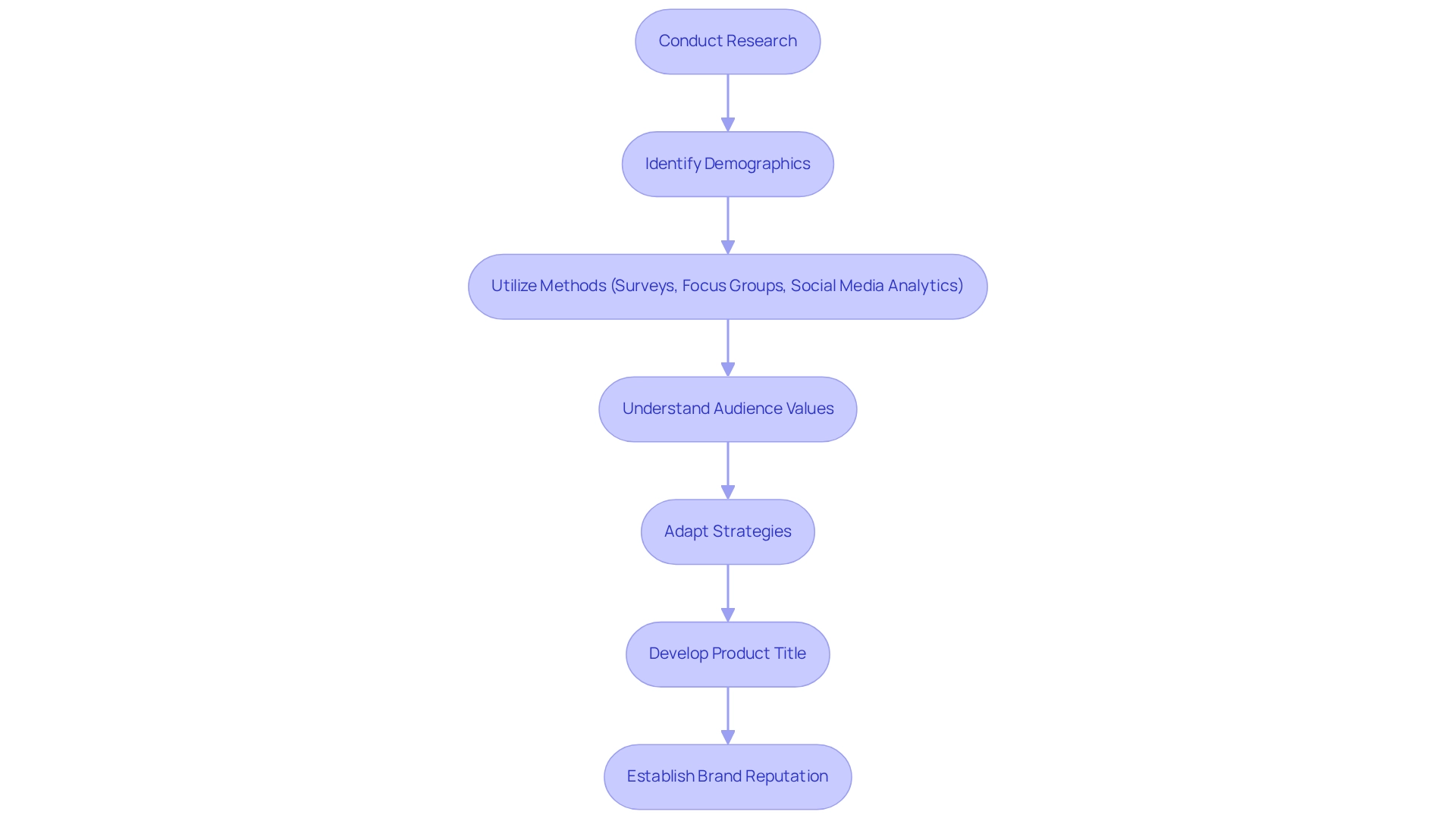
Step 2: Brainstorming Potential Brand Names
With a solid understanding of your target market, the next step is to generate potential product titles. Gather a varied group or use brainstorming tools to create a list of words and phrases that encapsulate your organization’s identity and values. Employ techniques such as mind mapping, which visually organizes ideas, or word association to broaden your creative scope.
Additionally, consider utilizing the ‘Crazy eights’ technique, where participants sketch out eight ideas in eight minutes. This method encourages rapid idea generation and fosters creativity. Another effective approach is ‘Reverse Brainstorming,’ which flips the problem-solving paradigm by asking how to cause a problem instead of how to solve it. This can lead to unique insights and innovative ideas. Strive for a balanced mix of descriptive, abstract, and invented terms.
For instance, if your company emphasizes health and wellness, consider words like ‘vitality’ or ‘nourish’ as foundational elements. As Hal Gregersen, a Senior Lecturer in Leadership and Innovation at MIT Sloan School of Management, notes, maintaining energy and engagement during brainstorming sessions is crucial; otherwise, the creativity can dwindle. Embrace unconventional thinking; frequently, the most distinctive concepts can transform into the most unforgettable labels.
A case study on ‘Rapid Ideation for Idea Generation’ illustrates that focusing on quantity over quality can significantly increase the chances of uncovering unique ideas. This method not only encourages creativity but also enhances the likelihood of discovering titles that resonate with your audience.
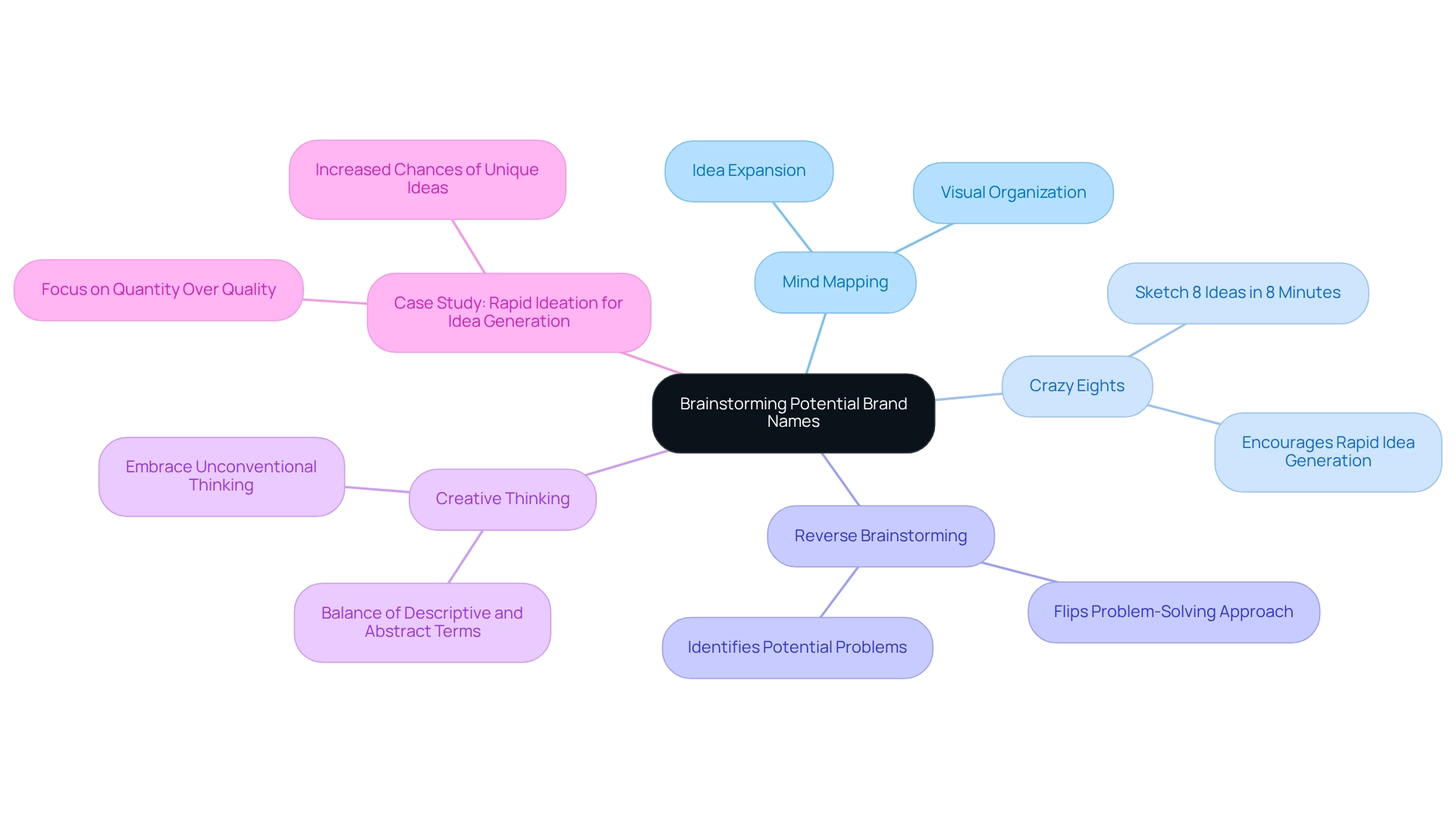
Step 3: Testing Your Brand Name Ideas
Once you have crafted a list of potential brand titles, the next critical step is to test these options with your target audience. Engaging in surveys or focus groups can provide invaluable insights into how each title is perceived. During these sessions, ask participants about their connections with the titles, their ease of pronunciation, and overall appeal.
For example, a title that initially seemed appealing to your internal team may not resonate with buyers, underscoring the necessity of external validation.
Gathering client opinions is vital in enhancing your company identity. This process not only aids in aligning the title with your company’s identity but also ensures it meets customer expectations. In 2024, mastering product label testing is essential for establishing a successful identity, allowing companies to refine their messaging based on authentic market insights.
Consider notable case studies, such as the comprehensive campaign for Quaker Oats. Here, WonderEight implemented innovative branding strategies that significantly enhanced customer loyalty. This illustrates the effectiveness of aligning product names with public perceptions. Additionally, the identity enhancement for Castania demonstrates how focused feedback can yield quantifiable results, highlighting the importance of user involvement in the naming process.
At WonderEight, we specialize in delivering tailored branding solutions that resonate with target audiences. Our strategy encompasses thorough market analysis and feedback systems that ensure your label aligns with market expectations. Statistics reveal that specific product categories, such as treatments for metabolic syndrome, are searched over 165,000 times each month, indicating a robust public interest that can inform naming strategies.
By prioritizing consumer input, brands can elevate their identities to better connect with their audience, ultimately fostering engagement and loyalty. As Phillip Davis, an expert in branding, aptly states, “Product naming is part art, part science. The finest titles are those that align with the product’s goals and resonate with the target market.” Therefore, gathering feedback based on your naming objectives is crucial for success.
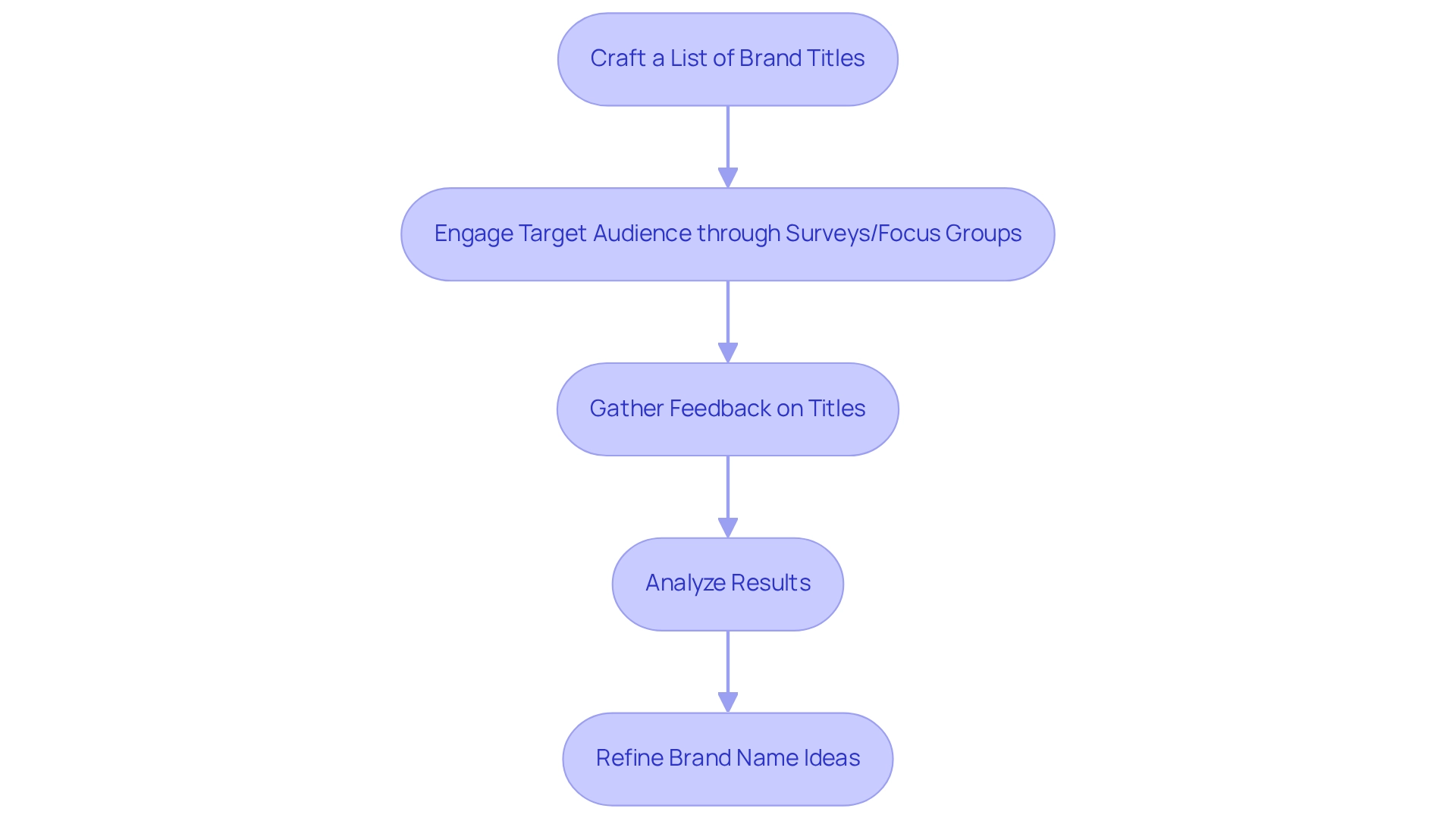
Step 4: Ensuring Name Availability and Uniqueness
Before finalizing your brand title, conducting a comprehensive search to ensure its availability and uniqueness is essential. Begin by examining trademark databases, such as the USPTO, to verify that your selected title is not already registered. Additionally, explore domain name registration sites and social media platforms to confirm that your name is not in use elsewhere.
This step is crucial to prevent legal issues stemming from trademark infringement, which can weaken your identity and influence in the marketplace. The Trademark Dilution doctrine safeguards well-known trademarks from dilution or tarnishing by others, underscoring the significance of a distinctive name.
In 2023, the typical expense of submitting a trademark application was around $275, a factor that can greatly influence your financial planning for intellectual property protection. Neglecting this crucial step may lead to unforeseen expenses and legal challenges. Moreover, the USPTO aims to complete the examination of an accelerated trademark application within three months, making timely searches even more important.
The USPTO also provides a Trademark Mediation program to assist in resolving conflicts before they escalate into formal proceedings, offering a proactive solution for trademark managers.
Consider the situation of a prominent company that faced legal challenges due to title similarities, such as the dispute between Apple Corps and Apple Inc. Such situations highlight the importance of ensuring that your trademark distinguishes itself from existing marks. By taking these proactive measures, you can establish a distinct identity that resonates with your target audience and mitigates the risk of future disputes.
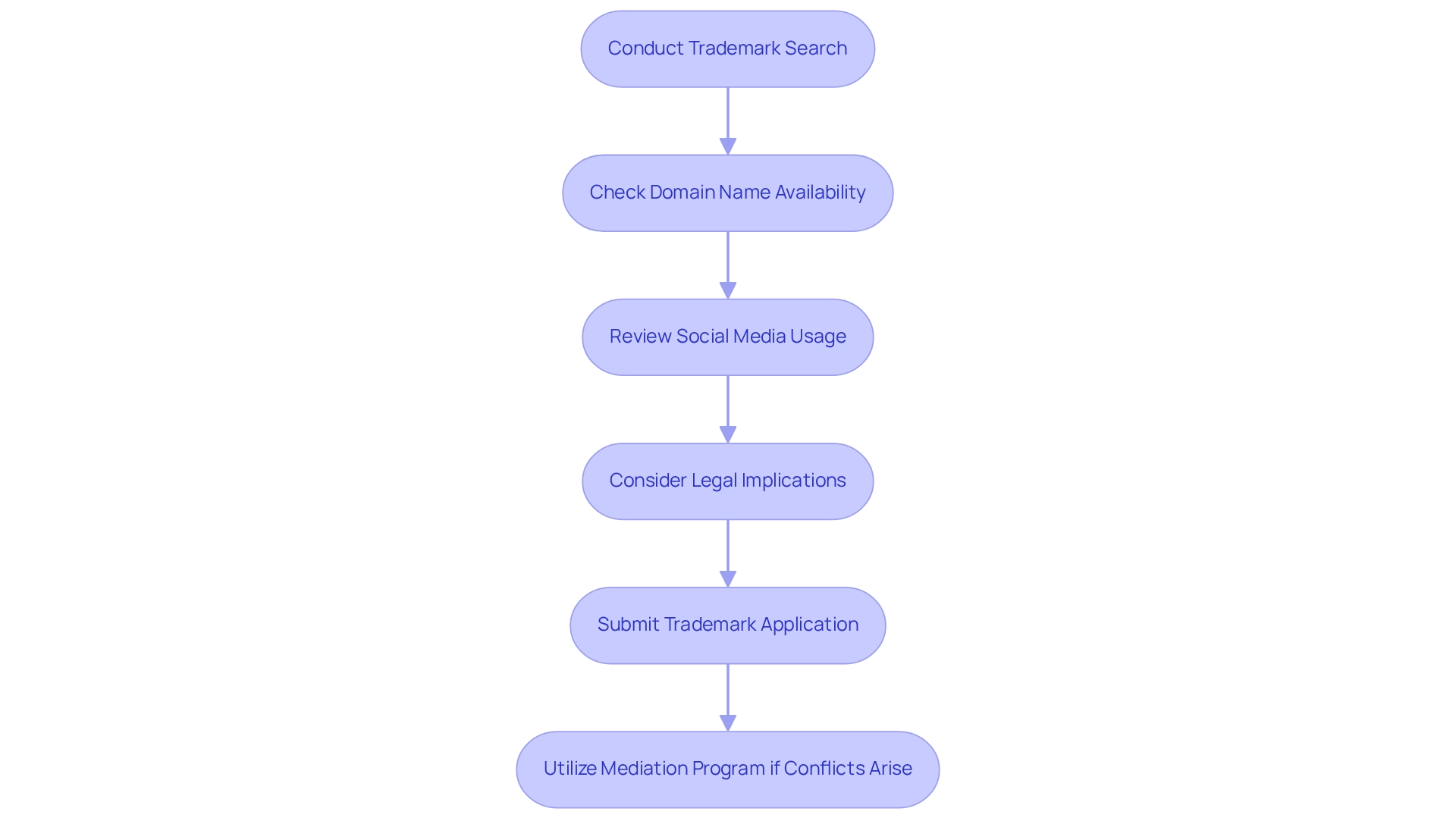
Step 5: Finalizing and Integrating Your Brand Name
After selecting a title that resonates with your target audience and is legally available, the next step is to finalize it. This process involves enhancing the title based on feedback to ensure it aligns seamlessly with your organization’s mission and values. Once this is accomplished, incorporating the title into your overall branding strategy is crucial.
This integration includes embedding it into your logo, website, and all marketing materials. Consistency is paramount; utilizing your identity uniformly across all platforms enhances recognition and builds trust with your audience. For example, if your label is ‘EcoWave,’ your logo and promotional materials should consistently reflect this eco-friendly ethos, reinforcing your identity and bolstering its market presence.
Research indicates that companies with consistent messaging can see a 20% increase in revenue, underscoring the importance of maintaining a unified image. Furthermore, as noted by the Global Climate and Health Alliance, ethical practices are essential in marketing, especially for companies aiming to establish trust and accountability in their market presence. By effectively integrating your company name, you not only improve recognition but also foster a loyal customer base.
Moreover, a recent case study on AI regulation emphasizes the growing demand for ethical marketing practices, reflecting broader societal expectations for companies to operate responsibly. Understanding your target audience is vital; with over 4 out of 5 individuals aged 18-25 having never utilized a large language model, managers must adjust their strategies to engage effectively with diverse demographics. By incorporating these elements into your marketing strategy, you can cultivate a more impactful and trustworthy identity.
Contact WonderEight to enhance your identity and explore innovative marketing strategies tailored to your needs.
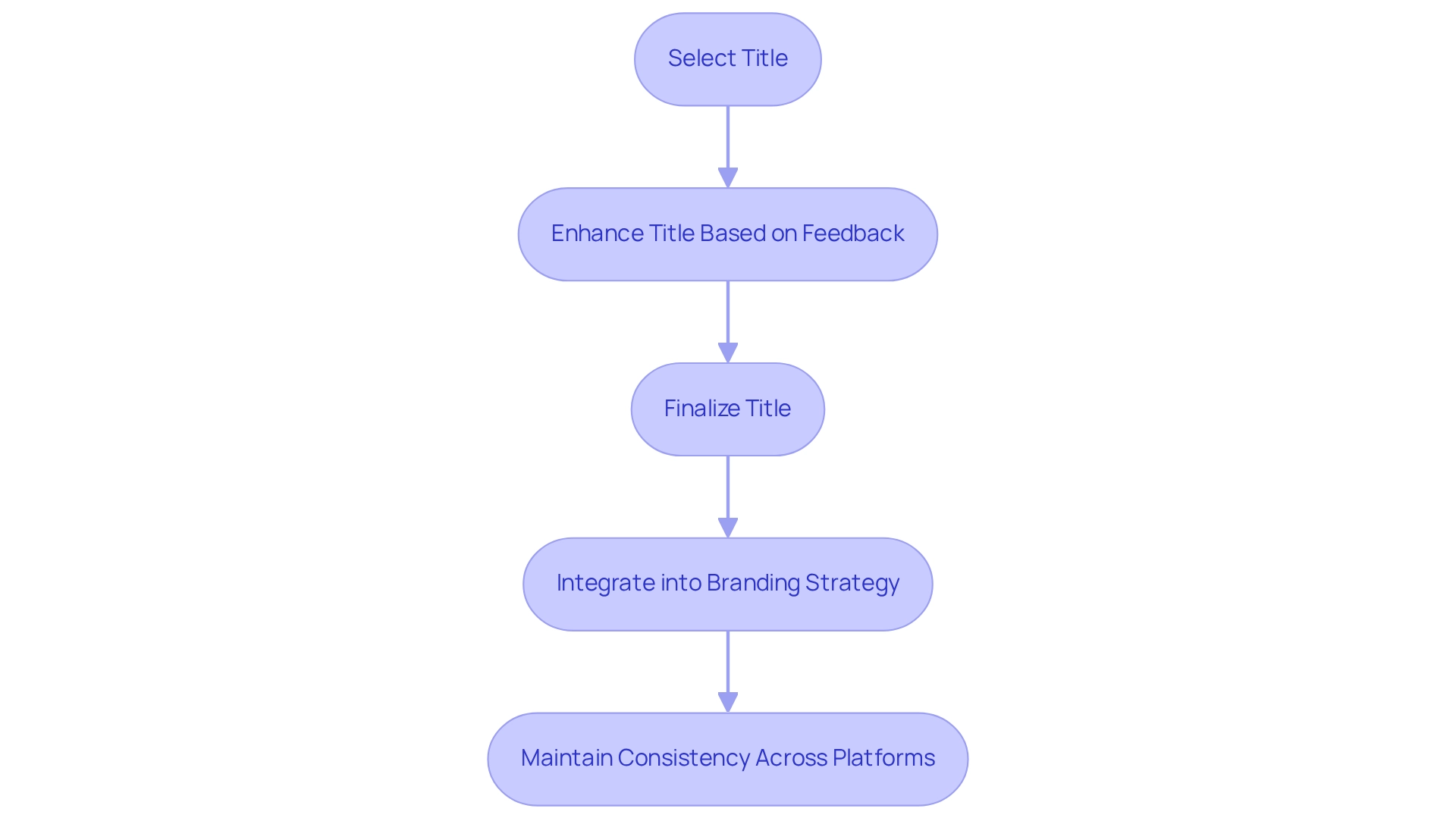
Common Mistakes to Avoid in Brand Naming
When naming your business, it is imperative to steer clear of common pitfalls that can severely undermine your branding efforts. One prevalent error is selecting titles that are overly complex or difficult to pronounce. Such titles can significantly hinder memorability, making it challenging for individuals to recall your brand.
Statistics reveal that 76% of consumers have been confused by companies using similar titles, underscoring the importance of uniqueness in branding. Distinctive brands, such as Apple® and Nike®, are easier to market and protect, while descriptive titles often get lost among competitors.
Moreover, it is essential to avoid titles that closely resemble established companies. This not only poses potential legal issues but also creates confusion in the marketplace for well-known brands. A distinctive title is vital for standing out and capturing interest, as evidenced by insights from investors who note that many startups struggle to differentiate themselves due to naming errors.
According to the study “Investor Perspectives on Product Naming,” investors highlighted that titles often fail to distinguish from rivals, indicating that a unique product title is crucial for attracting investment and standing out in the marketplace.
Another critical factor to consider is the cultural implications of your label. A title that resonates in one market may not have the same effect in another, potentially alienating your target audience. Therefore, conducting thorough research into cultural perceptions is essential to ensure your label aligns with your intended message.
As Paola Norambuena stated, ‘While titles are essential and significant components, they represent merely one aspect of your identity.’
Furthermore, hurrying the naming process can result in rushed decisions that may not accurately reflect your organization’s identity or objectives. Dedicating time to brainstorming, researching, and testing your title can yield substantial long-term benefits. By avoiding these common mistakes, you can create a memorable label that is not only unforgettable but also strategically sound, laying the groundwork for a successful identity.
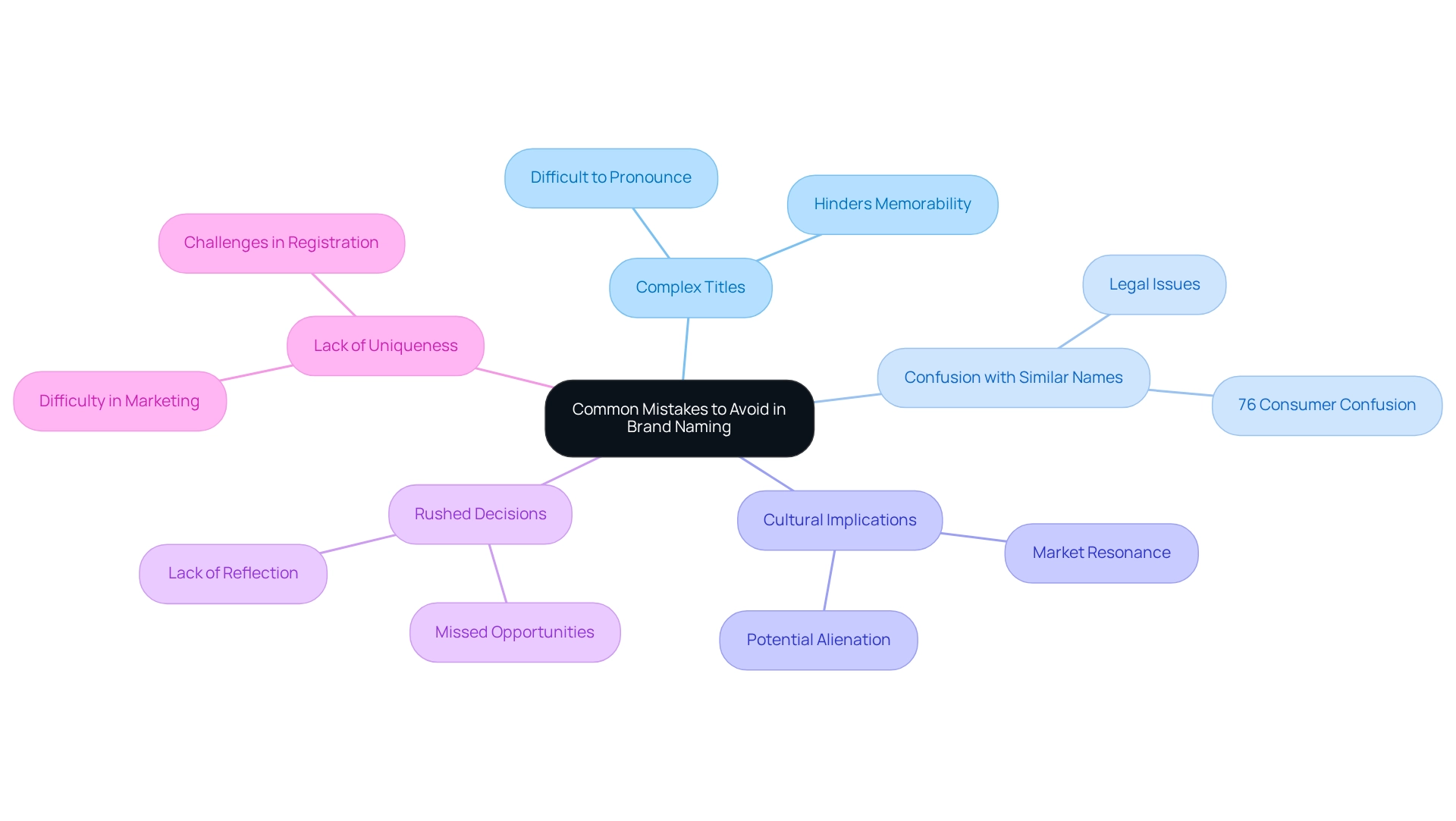
Key Takeaways for Successful Brand Naming
Developing a successful label is a complex process that begins with recognizing its critical role in establishing a robust market presence. An engaging product title serves as a powerful tool for enhancing brand recognition and nurturing customer loyalty, ultimately contributing to business success. Here are the essential steps to create a label that resonates with your target audience:
-
Recognize the Significance: A powerful label can greatly influence public perception and instill confidence. For instance, statistics reveal that only 29% of low-income shoppers trust their labels, compared to 38% of high-income consumers. This disparity underscores the necessity for a title that fosters confidence and credibility, particularly in markets where trust is paramount in purchasing decisions.
-
Identify Key Elements: Reflect on the core values and mission of your brand. A title should embody these elements while remaining memorable and easy to pronounce.
-
Conduct Thorough Market Research: Analyze competitors and market trends. The surge in clean and organic beauty products, driven by public concerns about harmful chemicals and sustainability, exemplifies how market dynamics can shape naming strategies. Understanding these trends will aid you in crafting a title that aligns with consumer values and expectations.
-
Brainstorm Creatively: Engage in imaginative brainstorming sessions to generate a diverse array of title ideas. Encourage innovative thinking to explore unique concepts that stand out.
-
Test Ideas: Solicit feedback from potential customers and stakeholders. Evaluating titles provides insights into their effectiveness in connecting with your target audience.
-
Ensure Availability: Verify trademark availability and domain registration to avoid legal complications and maintain a consistent online presence.
-
Avoid Common Pitfalls: Steer clear of titles that are overly complex or difficult to spell, as these can impede recognition. Successful businesses often exemplify effective naming processes. For example, WonderEight has guided numerous clients through the competitive landscape of brand identity, highlighting the importance of strategic naming. Their expertise in branding and online marketing strategies has yielded positive outcomes for many enterprises, leveraging market trends to enhance visibility and attraction.
In summary, by following these steps, you can develop a title that not only captures interest but also effectively conveys your entity’s identity. Remember, as Ben Franklin wisely stated, ‘It takes many good deeds to build a reputation, and only one bad one to lose it.’ Therefore, investing time and effort into crafting a strong brand name is crucial for long-term success.
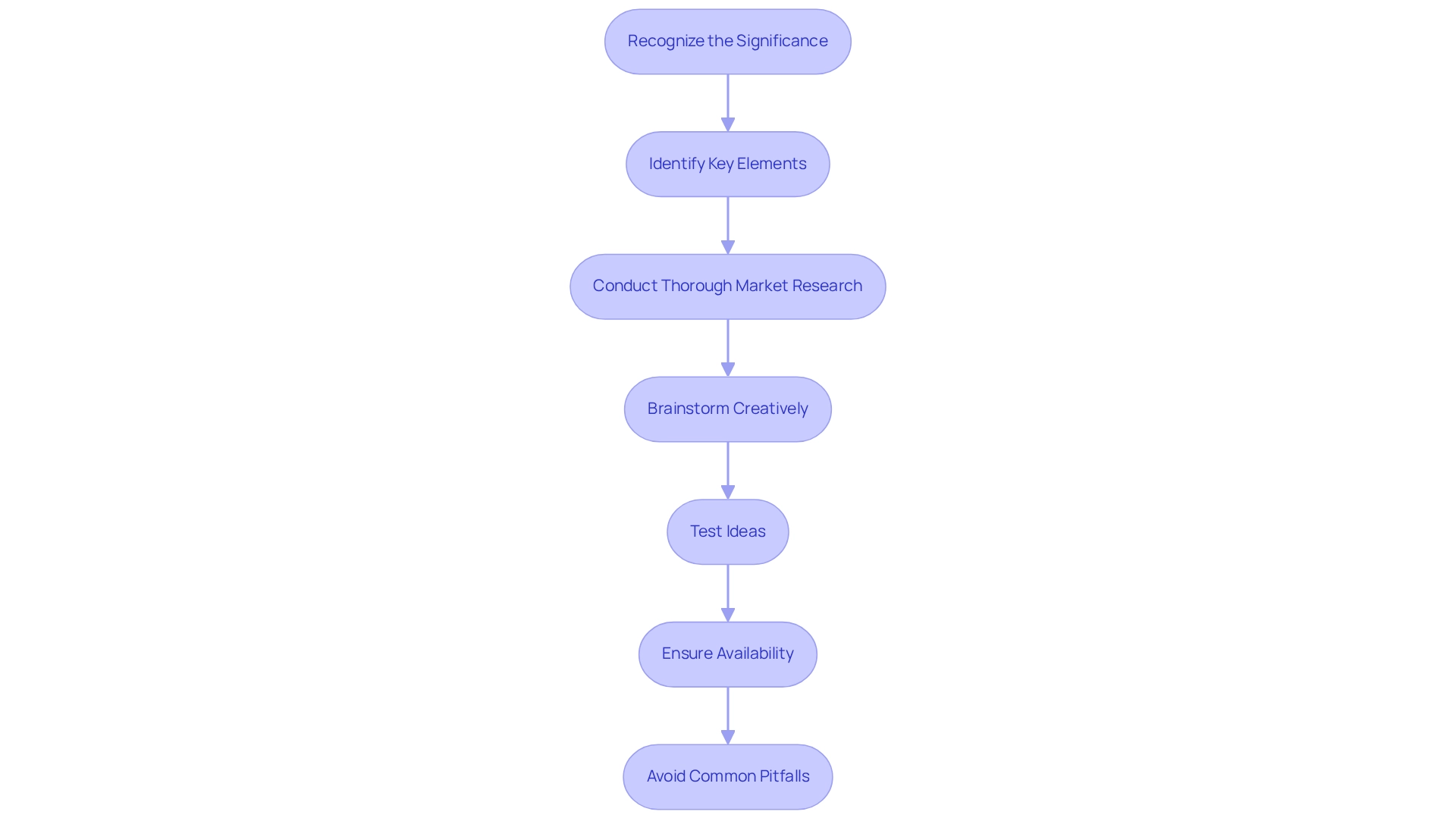
Conclusion
A strong brand name serves as the cornerstone of a business’s identity, profoundly impacting consumer perception, trust, and loyalty. The path to crafting an effective brand name encompasses several critical steps, commencing with comprehensive market research to grasp the target audience and their preferences. By pinpointing key demographics and values, businesses can formulate names that resonate deeply with potential customers, thereby amplifying the brand’s appeal.
Equally essential is the brainstorming and testing of potential names. Engaging diverse teams and employing creative techniques can yield unique and memorable names that encapsulate the brand’s essence. Soliciting feedback from consumers during testing phases guarantees that the selected name aligns with expectations and cultivates a sense of connection. Moreover, ensuring the name’s availability and uniqueness shields the brand from legal complications and solidifies its identity in the marketplace.
Ultimately, steering clear of common pitfalls—such as overly complex names or cultural insensitivity—is crucial for establishing a recognizable and trustworthy brand. By adhering to these strategies and recognizing the significance of a strong brand name, businesses can forge a lasting impact that propels success in a competitive landscape. Investing in a compelling brand name transcends mere marketing tactics; it is a strategic decision that lays the groundwork for future growth and consumer loyalty.
Frequently Asked Questions
Why is a powerful label important for a business?
A powerful label is essential for establishing business identity, serving as the initial point of contact for prospective clients. It plays a critical role in building recognition and trust, which are vital for any successful branding strategy.
What qualities should an effective label have?
An effective label should be memorable, easy to pronounce, distinctive, and closely aligned with the company’s identity. Ideally, it should consist of two to four syllables and evoke positive associations to influence public perception.
How does a strong identity impact consumer trust?
A strong identity fosters consumer trust, as companies that maintain authenticity are more likely to build enduring connections with their clients, even in challenging situations.
What statistics highlight the importance of branding?
Statistics reveal that 88% of customers prioritize authenticity in branding, and 82% of potential job candidates assess a company’s reputation before applying, indicating the significance of a strong identity in attracting both customers and talent.
How can companies enhance their branding strategy?
Companies can enhance their branding strategy by conducting thorough research on their target audience, understanding their values and preferences, and utilizing various marketing solutions such as brand audits, brand strategy, and digital marketing strategies.
What role does video play in modern marketing strategies?
Video is a powerful tool in modern marketing that enhances identity and engagement, making it easier for businesses to connect with their audiences.
What are the repercussions of neglecting brand identity?
Neglecting brand identity can lead to severe consequences, including erosion of customer trust and diminished sales, as effective marketing is crucial for maintaining recognition and loyalty.
How can WonderEight assist businesses in establishing their identity?
WonderEight offers a variety of services, including brand audits, brand strategy, and digital marketing strategy, to help businesses create an identity that genuinely reflects their core values and resonates with their target audience.



